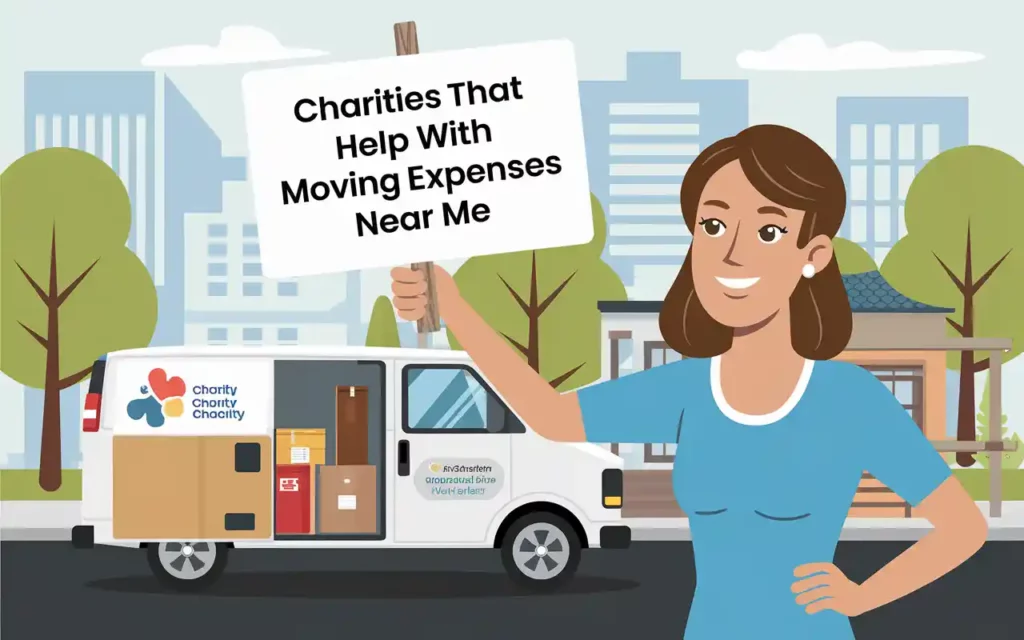Discover top charities that help with moving expenses near me, providing essential financial and logistical support to ease the burden of relocation for low-income families and individuals.
Table of Contents
Relocating to a new home can mark a fresh start, but the financial strain of moving expenses often turns this opportunity into a significant challenge. Costs like hiring movers, renting trucks, purchasing packing supplies, and covering security deposits can quickly escalate, with local moves averaging $1,000–$2,000 and long-distance moves costing significantly more. For low-income families, individuals facing sudden life changes, or those escaping unsafe situations, these expenses can be overwhelming. Fortunately, numerous charities that help with moving expenses near me offer critical support, providing financial aid, volunteer assistance, and resources to make relocation affordable and manageable.
This comprehensive guide explores the best charities that help with moving expenses near me, detailing their programs, eligibility requirements, and application processes. We’ll also cover why people need help with moving costs, how to find local assistance, and practical ways to reduce moving expenses. With a FAQ section and alternative resources, this blog post aims to empower you to navigate the financial hurdles of relocation and secure the support you need for a smoother transition.
Why People Need Help with Moving Expenses
Moving is a costly endeavor that can strain even stable budgets, but for many, these expenses are particularly burdensome due to specific circumstances. Here are the primary reasons people seek assistance from charities that help with moving expenses near me:
- Financial Hardship: Low-income households often lack the savings to cover moving costs, especially unexpected expenses like security deposits or last-minute truck rentals. A single move can consume a significant portion of their monthly income, making assistance essential.
- Job-Related Relocation: Accepting a new job often requires relocating, but not all employers provide relocation stipends. Low-wage workers, in particular, may struggle to afford the upfront costs of moving for better opportunities.
- Escaping Domestic Abuse: Survivors of domestic violence frequently need to relocate quickly to ensure safety, often with limited resources. Charities provide emergency funds to cover moving costs, enabling swift and secure transitions.
- Housing Instability or Eviction: Families facing eviction or homelessness may need to move to stable housing but lack the funds for movers, deposits, or transportation. Assistance prevents prolonged displacement.
- Natural Disasters: Disasters like floods, hurricanes, or wildfires can force sudden relocations, leaving individuals without the means to cover moving expenses. Charities offer aid to help rebuild lives in new locations.
- Medical or Family Emergencies: Health crises or family obligations, such as caring for a loved one, may require relocation. Medical bills or caregiving costs can deplete savings, necessitating external support for moving.
- Veterans and Military Transitions: Veterans transitioning to civilian life or military families relocating to new duty stations often face high moving costs, especially if government assistance is delayed or insufficient.
These challenges highlight the critical role of charities that help with moving expenses near me, offering a lifeline to those who might otherwise face homelessness or financial ruin.
Top Charities That Help With Moving Expenses
Below is a detailed list of prominent charities and organizations in the U.S. that provide moving expense assistance. These organizations are recognized for their commitment to supporting low-income individuals, families, veterans, and domestic abuse survivors.
1. The Salvation Army
With a network serving over 30 million Americans annually, the Salvation Army’s Housing Now program and local initiatives provide financial and logistical support for moving expenses.
- Services Offered: Grants for moving truck rentals, security deposits, or temporary housing; volunteer assistance for packing and moving.
- Eligibility: Prioritizes low-income households, those at risk of homelessness, or individuals facing emergency relocations. Requires proof of income, relocation details, and ID.
- How to Apply: Visit SalvationArmy.org to find a local branch or call (e.g., NYC at 212-975-1000). Submit documentation like a lease agreement or moving cost estimates.
- Availability: Nationwide, with funding limited by local resources.
2. Catholic Charities USA
Catholic Charities supports housing stability through its 168 local agencies, offering moving assistance to prevent homelessness or support emergency relocations.
- Services Offered: Financial aid for movers, truck rentals, or storage units; temporary housing; and volunteer support.
- Eligibility: Open to anyone in need, especially those who are homeless or fleeing domestic abuse. Requires proof of income, relocation need, and ID.
- How to Apply: Visit CatholicCharitiesUSA.org or call 703-549-1390 to locate a local agency. Complete an application with required documents.
- Availability: Nationwide, with services varying by agency.
3. YWCA
The YWCA empowers women and families, with many branches offering moving assistance, particularly for domestic abuse survivors or low-income households.
- Services Offered: Grants for moving costs, including truck rentals and security deposits; transitional housing support.
- Eligibility: Focuses on women, especially abuse survivors, and low-income families near a YWCA branch. Requires proof of need and residency.
- How to Apply: Visit YWCA.org or call 202-467-0801 to find a local branch. Follow their application process, which may include an interview.
- Availability: Available at select YWCA locations, varying by branch.
4. Modest Needs
Modest Needs offers self-sufficiency grants to low-income individuals who don’t qualify for government aid but face temporary financial crises.
- Services Offered: One-time grants ($750–$1,250) for moving expenses like truck rentals, movers, or deposits.
- Eligibility: Requires income at or near the poverty line and a demonstrated need for relocation. Proof of income and expenses is needed.
- How to Apply: Apply online at ModestNeeds.org with documentation of income and moving costs.
- Availability: Nationwide, subject to donor funding.
5. United Way (211 Hotline)
United Way’s 211 hotline connects individuals with local charities that help with moving expenses near me, serving as a critical resource for finding community support.
- Services Offered: Referrals to local charities, nonprofits, and government programs offering moving assistance.
- Eligibility: Open to anyone; no specific criteria to use the hotline.
- How to Apply: Call 211 or visit 211.org to speak with an operator who identifies local resources based on your location.
- Availability: Nationwide, with connections to local agencies.
6. Habitat for Humanity
Habitat for Humanity supports affordable housing and, in some cases, offers moving assistance for families transitioning to Habitat homes or stable housing.
- Services Offered: Financial aid for moving costs; volunteer support for packing and moving; housing resource connections.
- Eligibility: Prioritizes low-income families or those moving into Habitat homes. Requires proof of income and housing need.
- How to Apply: Contact a local chapter via Habitat.org or by phone to inquire about moving assistance.
- Availability: Varies by local chapter, with larger communities offering more resources.
7. Local Churches
Local churches, including Baptist, Methodist, and Episcopal congregations, often provide moving assistance through benevolence funds or outreach programs.
- Services Offered: Grants or loans for moving expenses; volunteer help for packing and transportation; referrals to other resources.
- Eligibility: Varies by church, often open to community members. May require proof of financial hardship or relocation details.
- How to Apply: Contact churches directly via phone or in-person visits with documentation like a lease or moving estimates.
- Availability: Depends on church resources; larger congregations may have more funds.
8. Community Action Agencies
Community Action Agencies (CAAs) collaborate with charities and government programs to provide moving and housing assistance to low-income families.
- Services Offered: Financial aid for moving costs, security deposits, or temporary housing; connections to discounted moving services.
- Eligibility: Focuses on low-income households with proof of income, residency, and relocation needs.
- How to Apply: Find a local CAA via 211.org or state social services websites. Submit an application with documentation.
- Availability: Nationwide, with services varying by agency.
Types of Moving Assistance Offered by Charities

Charities that help with moving expenses near me offer diverse support tailored to individual needs. Here are the main types of assistance:
- Financial Grants: One-time payments ($300–$1,250) for costs like truck rentals, movers, storage units, or security deposits.
- Volunteer Support: Volunteers assist with packing, loading, or transportation, reducing out-of-pocket expenses.
- Temporary Housing: Programs like the Salvation Army’s Housing Now provide short-term housing during relocation.
- Discounted Services: Partnerships with moving companies offer reduced rates on trucks or movers.
- Referrals: Connections to government programs (e.g., HUD’s Emergency Solutions Grants) or local resources for additional support.
Eligibility Requirements for Moving Assistance
Eligibility for moving assistance varies by organization, but most charities that help with moving expenses near me share common criteria to ensure aid reaches those in greatest need. Here’s what you typically need to qualify:
- Income Level: Most programs target low-income households, often requiring income at or below 150–200% of the federal poverty line. Proof of income (e.g., pay stubs, tax returns, or unemployment records) is required.
- Demonstrated Need: Applicants must show a specific need for relocation, such as job changes, eviction, domestic abuse, or natural disasters. Supporting documents like eviction notices, job offer letters, or police reports may be needed.
- Residency: Some charities require proof of residency in their service area (e.g., utility bills or lease agreements) to prioritize local applicants.
- Household Composition: Priority is often given to families with children, seniors, veterans, or disabled individuals. Single adults may qualify but face stricter criteria in some programs.
- Emergency Situations: Many organizations prioritize urgent cases, such as domestic abuse survivors or those facing imminent homelessness, requiring documentation like shut-off notices or court orders.
- One-Time Assistance Limits: Some charities limit aid to once per year or impose a lifetime cap (e.g., one grant per household) to distribute funds equitably.
- Documentation: Common requirements include a valid ID, proof of income, a lease agreement, moving cost estimates, and evidence of financial hardship (e.g., medical bills or layoff notices).
Always check with the specific charity for exact requirements, as criteria can vary by location and program.
How to Find Local Help “Near Me”
Locating charities that help with moving expenses near me requires targeted research and outreach. Follow these steps to find local assistance efficiently:
- Use Online Directories:
- Visit 211.org to connect with local charities and nonprofits offering moving assistance in your area.
- Check websites like SalvationArmy.org, CatholicCharitiesUSA.org, or YWCA.org for local branch directories.
- Search “charities that help with moving expenses near me” on Google or community platforms like Nextdoor to find local resources.
- Contact Community Organizations:
- Reach out to local churches, community centers, or libraries, which often have information on charities or direct assistance programs.
- Call United Way’s 211 hotline to speak with an operator who can identify nearby charities based on your zip code.
- Leverage Social Media and Local Networks:
- Join local Facebook groups or community forums to ask for recommendations on charities offering moving assistance.
- Check social media pages of local nonprofits or churches for announcements about funding or volunteer programs.
- Visit Social Service Agencies:
- Contact your city or county’s social services department for referrals to charities that help with moving expenses near me.
- Community Action Agencies often coordinate with local charities and can guide you to appropriate resources.
- Network with Neighbors or Friends:
- Ask neighbors, coworkers, or friends for recommendations on local charities or churches with moving assistance programs.
- Community bulletin boards at grocery stores or libraries may list relevant organizations.
- Attend Community Events:
- Visit local charity events, housing fairs, or church outreach programs to learn about available assistance and connect with staff directly.
By combining these approaches, you can identify charities that help with moving expenses near me and access their support promptly.
How to Contact Charities for Moving Assistance
Once you’ve identified potential charities, follow these steps to apply for assistance:
- Gather Documentation:
- Collect proof of income, a lease agreement, moving cost estimates, ID, and any documents supporting your need (e.g., eviction notice or job offer letter).
- Organize digital or physical copies for easy submission.
- Contact the Charity:
- Call or visit the charity’s local office (e.g., Salvation Army, Catholic Charities, or YWCA) to inquire about their moving assistance program.
- Be clear about your situation, emphasizing urgent needs like eviction or job relocation.
- Note specific application days or deadlines, as some programs have limited funding cycles.
- Complete the Application:
- Follow the charity’s instructions, which may include online or paper applications, interviews, or document submission.
- Apply early, as funds are often first-come, first-served.
- Follow Up:
- Check application status if you don’t hear back within a week. Provide additional information promptly to avoid delays.
- Express gratitude if approved to build goodwill for future assistance.
How to Reduce Moving Costs Effectively
Reducing moving expenses can complement charity assistance, making your relocation more affordable. Here are practical strategies:
- Plan Early:
- Book movers or trucks early to secure lower rates and avoid peak season costs.
- Compare quotes from multiple moving companies for the best deal.
- Downsize Belongings:
- Sell or donate unused items via Craigslist, Facebook Marketplace, or charities to reduce moving volume.
- Host a garage sale to raise funds for moving costs.
- Use Free Packing Materials:
- Collect free boxes from stores, restaurants, or recycling centers.
- Use household items like towels or clothing to wrap fragile items instead of buying bubble wrap.
- Enlist Help:
- Ask friends or family to assist with packing or transportation in exchange for a small gesture like a meal.
- Borrow a truck or van to avoid rental fees.
- Negotiate with Movers:
- Request discounts from moving companies, especially for flexible dates or small loads.
- Check if charities partner with movers for discounted services.
- Explore Tax Deductions:
- If moving for a job, check IRS Form 3903 for deductions (available for military members in 2025; may expand later).
- Keep receipts for all moving expenses.
- Use Community Resources:
- Visit community centers for free packing supplies or moving workshops.
- Check bulletin boards for local moving deals or volunteer opportunities.
Additional Resources for Moving Assistance

If local charities cannot fully cover your moving expenses, explore these alternatives:
Federal and State Programs:
- HUD Emergency Solutions Grants (ESG): Funds moving costs for those at risk of homelessness. Apply via local government or HUD field offices.
- FEMA Relocation Assistance: Provides aid for disaster-displaced individuals. Apply at FEMA.gov.
- VA Housing Assistance: Offers relocation support for veterans. Contact va.gov/housing-assistance.
- USDA Rural Housing Service: Provides grants for rural residents relocating to affordable housing. Visit rd.usda.gov.
Employer Support:
- Negotiate relocation stipends with your employer during hiring discussions.
- Check HR for company-specific moving assistance programs.
Crowdfunding:
- Use GoFundMe to raise funds from your network. Share a compelling story about your relocation needs.
- Promote your campaign on social media for broader reach.
Local Government Programs:
- Cities like NYC offer HRA Special Grants for moving costs. Contact your local social services department.
- Check state-specific programs for low-income residents.
Nonprofits:
- Housing Industry Foundation: Provides emergency housing funds, including moving costs. Apply via their website.
- Feeding America: Offers travel meal packs or resource connections for relocating families.
FAQs About Moving Assistance Charities
1. Do I need to be a member of a charity’s community or religious group to receive moving assistance?
No, most charities, like the Salvation Army and Catholic Charities, assist anyone in need, regardless of affiliation. Some churches may prioritize members, so confirm with the organization.
2. What documentation is required to apply for moving assistance?
You’ll typically need proof of income, a lease agreement, moving cost estimates, a valid ID, and evidence of hardship (e.g., eviction notice or job offer letter). Check with the charity for specifics.
3. How much assistance can I expect from these charities?
Grants range from $300–$1,250, covering costs like truck rentals or deposits. Some offer full coverage for emergencies, while others provide partial grants or volunteer support.
4. What if local charities cannot help with my moving expenses?
Explore government programs like ESG, FEMA, or VA housing assistance. Contact 211 for referrals, negotiate employer support, or use crowdfunding platforms like GoFundMe.
Conclusion
Moving expenses can be a significant barrier, but charities that help with moving expenses near me provide essential support to make relocation accessible for low-income families, veterans, and those facing emergencies. Organizations like the Salvation Army, Catholic Charities, and YWCA offer financial grants, volunteer assistance, and connections to resources, helping you overcome the costs of moving. By understanding eligibility requirements, researching local charities, and applying early, you can secure the aid you need.
Additionally, adopting cost-saving strategies like downsizing or using free packing materials can reduce expenses, while alternative resources like government programs or crowdfunding offer further support. With persistence and the right resources, you can navigate the financial challenges of moving and start your new chapter with confidence. Reach out to these charities today to ease your relocation journey.
Do Follow Dragcast on Social Media For More Such Content.







Add Comment